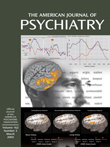Aripiprazole and Depression in Schizoaffective Disorder
To the Editor: Aripiprazole, the newest atypical antipsychotic, is reported to have a novel mechanism of action. It is a partial agonist at both the dopamine D2 and serotonin 5-HT1A receptor and an antagonist at the 5-HT2A receptor (1). Its novel mechanism of action suggests that this drug may have unique therapeutic effects in some patients (2). We encountered a patient with chronic treatment-resistant depression who responded to a trial of aripiprazole.
Mr. A, a 54-year-old married white man, was diagnosed with schizoaffective disorder, bipolar type. He experienced an onset of manic symptoms and psychosis beginning at age 12. His psychotic symptoms persisted during periods of euthymia. His later depressive episodes became more chronic and severe, with significant suicidal ideation. He had had multiple hospitalizations for depression. His most recent manic episode had also required hospitalization. He had suffered from chronic depression that was unresponsive to numerous antidepressants, including adequate trials with venlafaxine, paroxetine, lamotrigine, and sertraline. He had additionally been treated with a series of atypical antipsychotics, including risperidone, ziprasidone, and quetiapine. When we assumed his care, he was receiving 160 mg/day of ziprasidone, 150 mg/day of sertraline, 300 mg/day of lamotrigine, and 2 mg/day of risperidone. Although his psychotic symptoms were controlled, he was depressed and functioning poorly.
Aripiprazole, 15 mg/day, was initiated and later increased to 30 mg/day. Risperidone and ziprasidone were tapered and discontinued. Mr. A experienced a progressive resolution of his depression. Within 2 weeks of beginning treatment with aripiprazole, he reported improved mood, interest, energy, and concentration. Suicidal and homicidal ideation, hopelessness, and auditory hallucinations abated, and he developed a positive affect. His Global Assessment of Functioning Scale score went from 50 to a present score of 75. His Clinical Global Improvement ratings went from “no change” to “very much improved.” Mr. A stated that he was happy and better able to tolerate stress and indicated that his “life [had] improved substantially.” Lamotrigine and sertraline were also tapered and discontinued. He was currently taking aripiprazole, 30 mg/day, as monotherapy, with no manic or depressive episodes over the last 12 months.
This is the first case report, to our knowledge, of an antidepressant response to aripiprazole in schizoaffective disorder. Aripiprazole replaced “polypharmacy” in this schizoaffective patient, reducing drug costs, the risk of drug interactions, and potential adverse drug effects (3). Aripiprazole deserves further study for the treatment of depression in schizoaffective disorder and bipolar disorder.
1. Potkin SG, Saha AR, Kujawa MJ, Carson WH, Ali M, Stock E, Stringfellow J, Ingenito G, Marder SR: Aripiprazole, an antipsychotic with a novel mechanism of action, and risperidone vs placebo in patients with schizophrenia and schizoaffective disorder. Arch Gen Psychiatry 2003; 60:681–690Crossref, Medline, Google Scholar
2. Casey D, Carson W, Anutosh S, Liebeskind A, Ali M, Jody D: Switching patients to aripiprazole from other antipsychotic agents: a multicenter randomized study. Psychopharmacology (Berl) 2003; 166:391–399Crossref, Medline, Google Scholar
3. Marder SR, McQuade RD, Stock E, Kaplita S, Marcus R, Safferman AZ, Saha A, Ali M, Iwamoto T: Aripiprazole in the treatment of schizophrenia: safety and tolerability in short-term, placebo-controlled trials. Schizophr Res 2003; 61:123–136Crossref, Medline, Google Scholar



